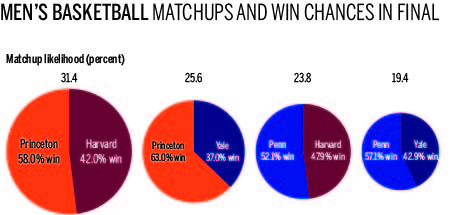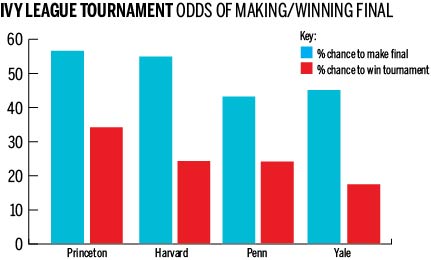
This weekend marks a monumental moment in Ivy League basketball history, when the top four men’s and women’s teams will compete for the conference’s automatic bids to March Madness at the inaugural Ivy League Tournament in Philadelphia.
Supporters of the Ancient Eight playoff couldn’t have scripted better semi-final matchups on the men’s side, with Yale taking on Harvard and Penn facing Princeton in the two biggest rivalry games the conference has to offer. Even though Harvard and Princeton swept their respective rivals this season, no Ivy League team has ever beaten another conference foe three times in the same season. At the beginning of the season, I created a model to calculate win percentages for any Division I basketball matchup, which I use here to break down the Yale men’s basketball team’s odds against its Ancient Eight playoff competition.
My model gives Yale a 45.1 percent chance to beat the Crimson at the Palestra on Saturday. This win probability corresponds with a predicted score differential of 2.2 points, meaning that Harvard is favored by just one field goal. If the Bulldogs are to beat their hated rivals from Cambridge, they will need to have a much stronger second half than they had in either of the two regular-season games.
In both games against Harvard — on Feb. 11 and Feb. 24 — Yale actually led at the half only to be outplayed in the final 20 minutes, losing the second-half rebounding battle to the Crimson by a combined margin of 40–28. Rebounding has been a forte of the Elis throughout the James Jones era, and it will surely be a point of emphasis on this week’s scouting report.
Moreover, Yale averaged 8.5 assists per game this season against Harvard compared to 16.0 assists per game over the course of the regular season. The Bulldogs’ disjointed offense manifested itself in poor shooting — Yale sank just 11.1 percent and 21.4 percent of its three-point shots in two games against Harvard, well below its season average of 36.2 percent. Suggesting that Yale needs to shoot the three well, create good ball movement and rebound better in order to beat Harvard sounds almost too obvious, but it really is that straightforward: If the Bulldogs want to upset the Cantabs this weekend, they will need stick with the fundamentals that yielded success in the rest of the regular season.
Perhaps the only team upset about the new rules for awarding the Ivy League’s automatic berth in the NCAA tournament is undefeated regular-season champion Princeton. While in the 14-game-tournament format the Tigers would already be focusing their attention on the Big Dance, they instead are tasked with facing a hot Penn team in a true road game.
Playing on the road drops the Tigers’ chances of reaching the final by roughly 8 percent compared to playing Penn on a neutral court, and by 16 percent compared to playing Penn at Jadwin Gym in Princeton. As a result of this unlucky draw, Princeton has only a 56.8 percent chance to defeat the rival Quakers, and just a 34.2 percent chance to win the tournament and secure the conference’s bid to March Madness.
Consider this: it’s almost twice as likely that someone other than Princeton — a team that put together the most impressive Ivy League regular season in a decade — will represent the Ancient Eight in the NCAA tournament than it is that the Tigers will clinch their first March Madness appearance since 2007. The Ivy League should not have buyer’s remorse, however. Had Princeton taken care of business in its non-conference schedule, we might be looking at a two-bid Ivy League on the men’s side.
In the first semi-final between the rival P’s, Yale and its fans should root for Penn. Even though a potential finals matchup with the Quakers would be a true road game, our model gives the Bulldogs to a 42.9 percent chance to win this hypothetical final compared to only a 37.0 percent chance to defeat Princeton. Should Penn get by Princeton, it would then become the favorite to win the Ivy League Tournament as a result of its home-court advantage. The good news for Yale and Penn fans is that our model predicts a Princeton-Harvard final just 31.4 percent of the time.
For years, players and coaches have been pushing for this tournament. Now, it is finally here. I can only make one prediction about the Ancient Eight tournament with absolute certainty: whatever happens, it’ll be all-out Ivy madness.








